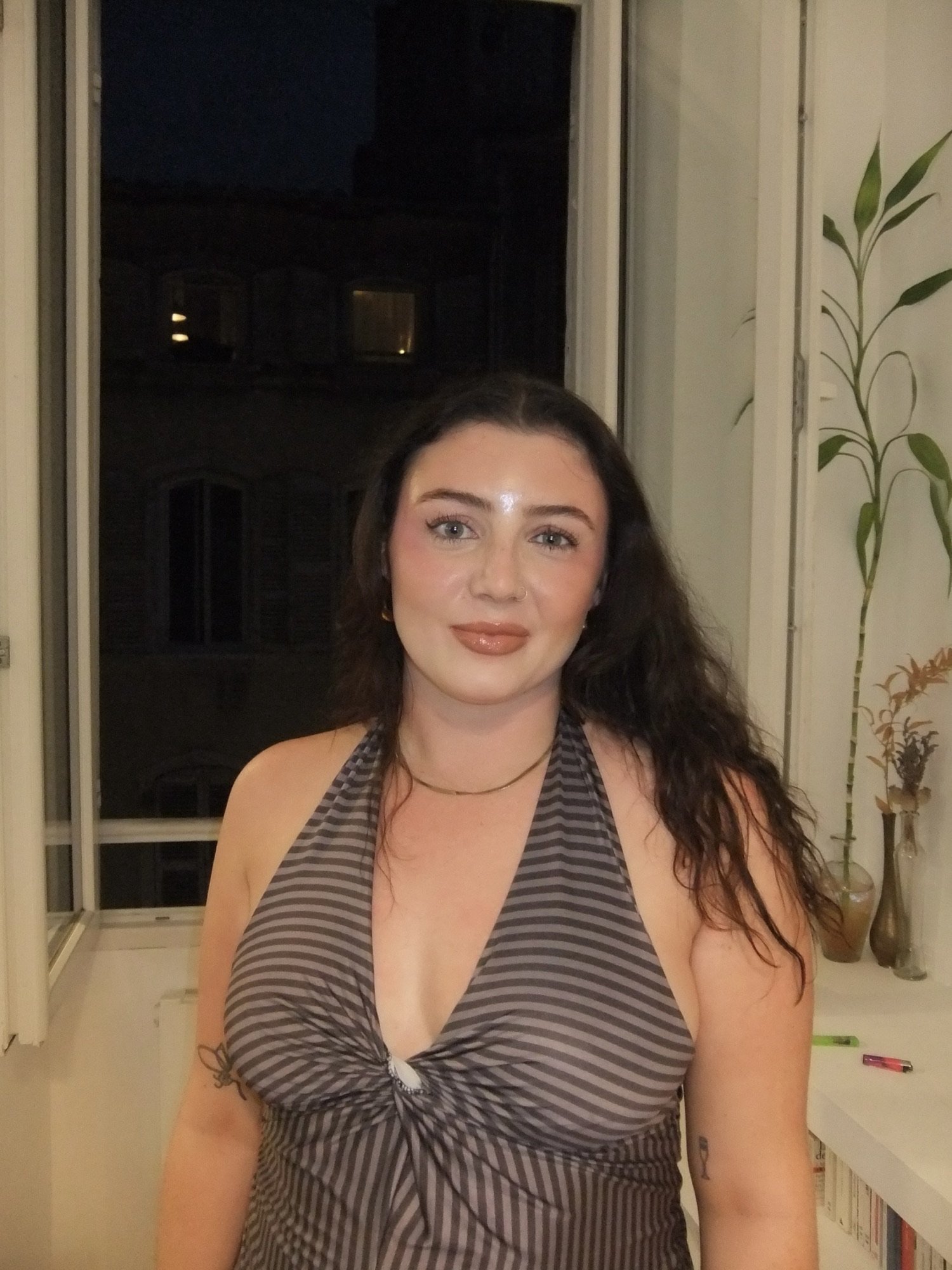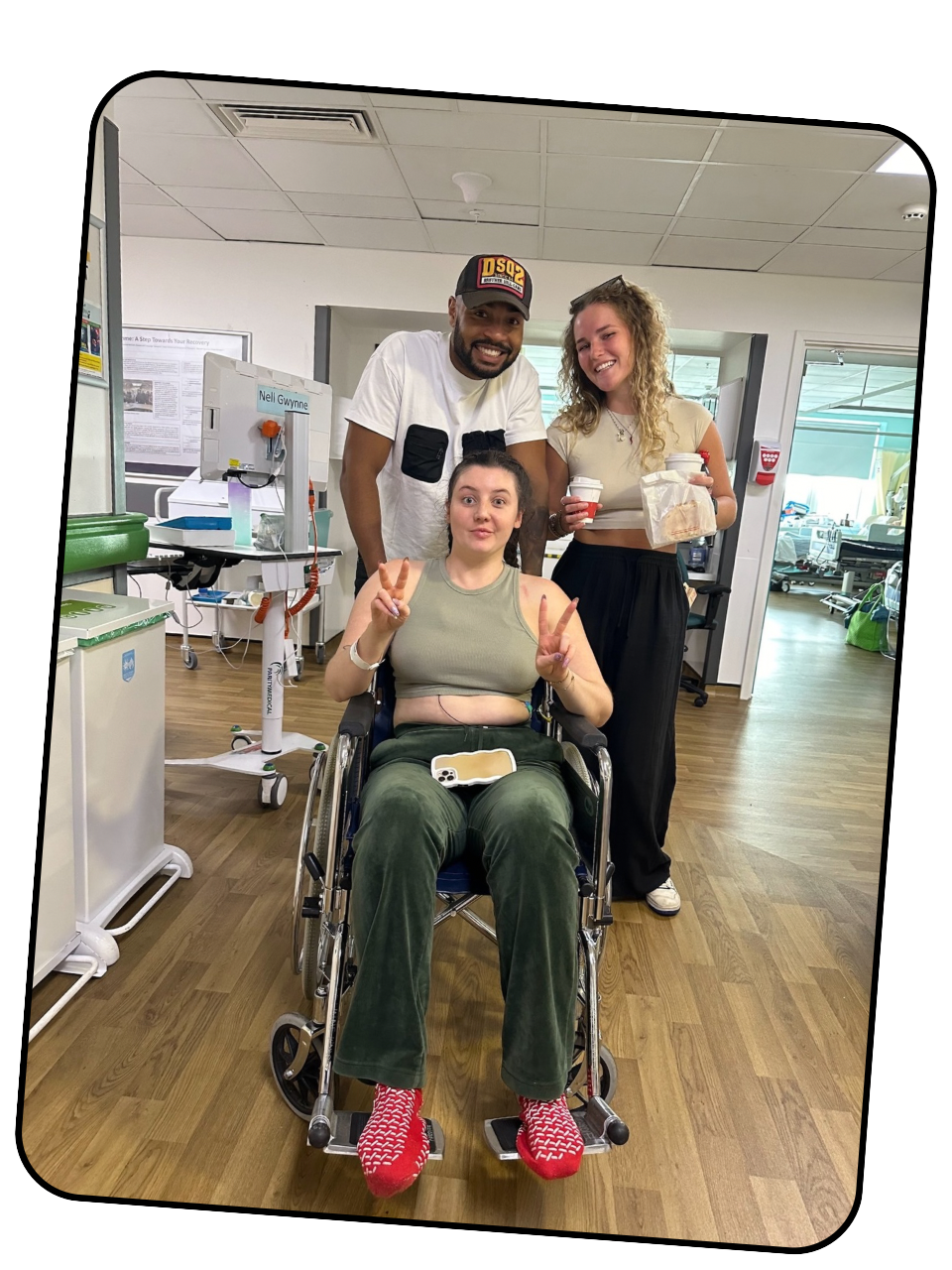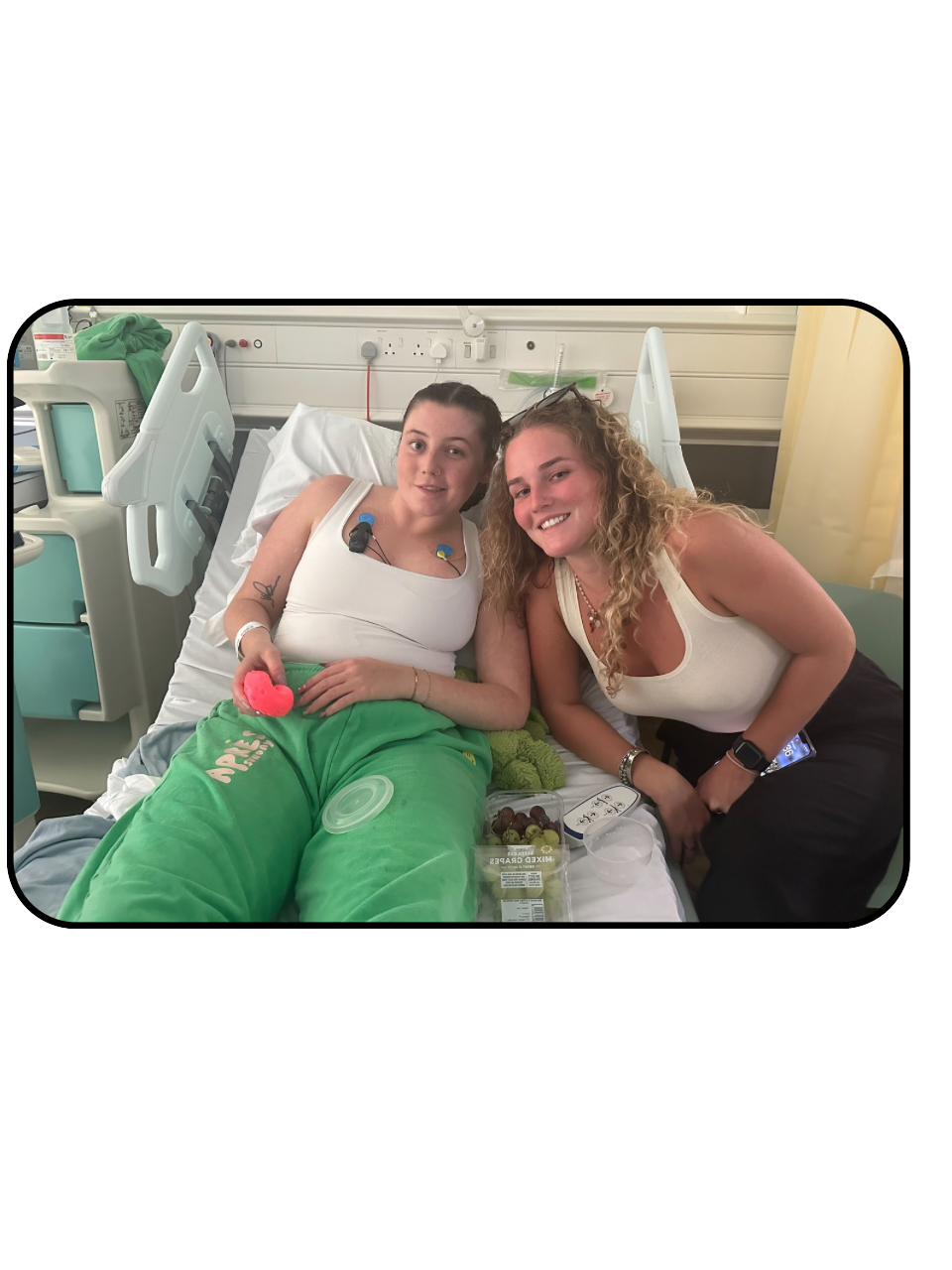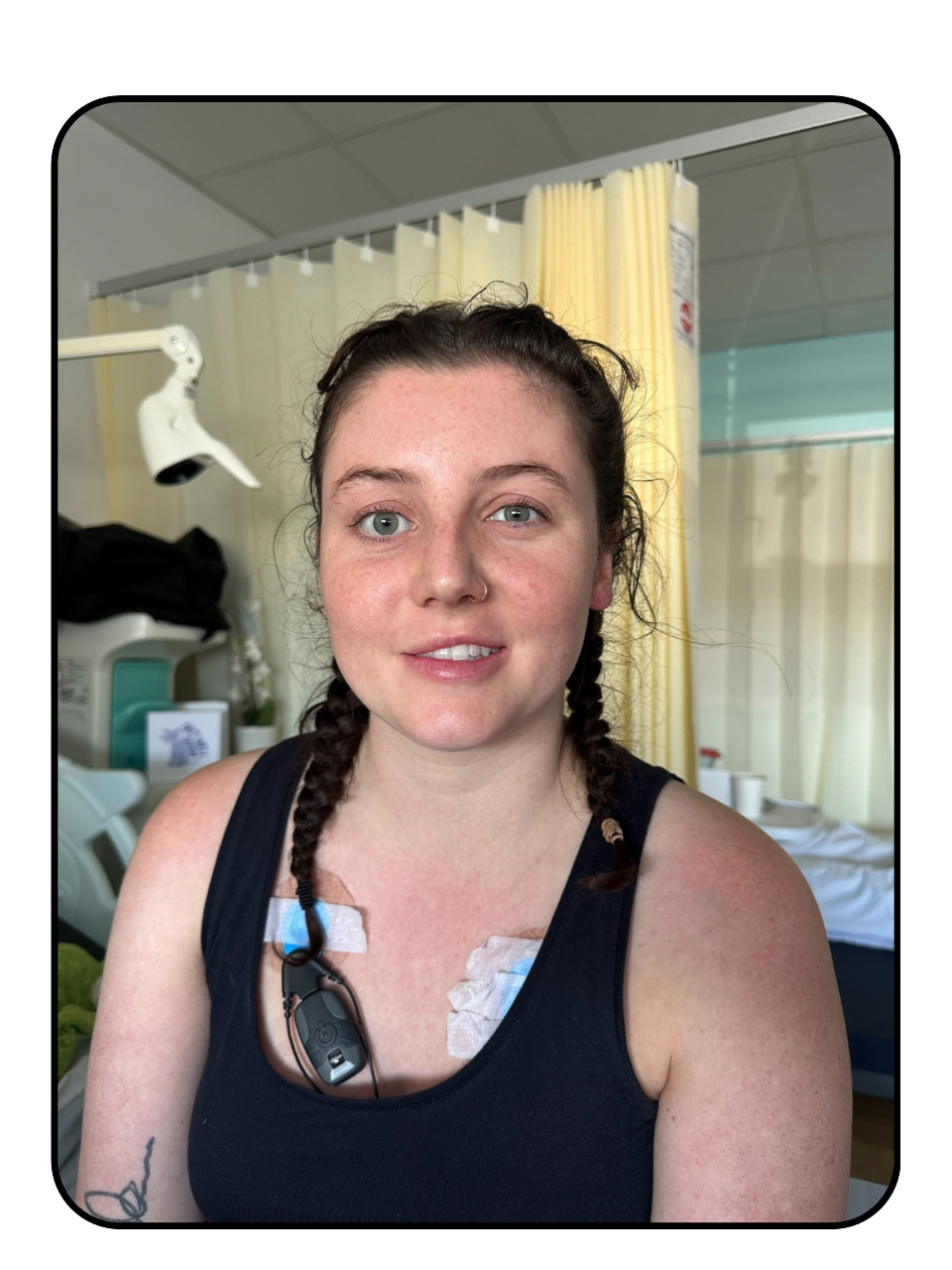Niamh’s story.
Stroke at 26.
My first girls trip post-stroke.
It was a huge milestone. We were moving in together properly for the first time. Everything was happening at once. I was under a huge amount of pressure, but I didn’t realise just how much I was taking on. Unbeknown to me, something far more dangerous was happening inside my body. I had an undiagnosed hole in my heart—a condition known as a Patent Foramen Ovale (PFO). Combined with being on the combined contraceptive pill and the relentless stress I was under, it was the perfect storm.
That night in August, everything changed. It happened through the night. I was sleeping next to Reece and was really fidgety. I woke up and thought I had cramp down my right-hand side. I figured I’d just slept funny, so I went back to sleep. But I was restless, and something felt wrong, although I couldn’t put my finger on it at the time. At around 8 a.m., Reece tried to wake me before he left for work. When I got up, I knew something was really wrong. I couldn’t walk properly. My right leg and arm weren’t working. Thank God Reece was there. Knowing me, I probably would’ve said, ‘It’ll be fine,’ and gone back to bed. I didn’t even know what a stroke was. You just don’t think about those things when you’re young.
Reece didn’t hesitate. He helped me into his car and drove me straight to Chelsea and Westminster Hospital. I remember feeling strangely calm in the car. I think I was in shock. I didn't panic because I didn’t really understand how serious it was. At the hospital, everything moved quickly. I was rushed through for a CT scan and MRI. It wasn’t long before the doctors gave me the news. They told me I’d had a stroke, I just couldn’t believe it. I was 26 years old. It didn’t even cross my mind that something like that could happen to me. I didn’t even really know what a stroke was and what that meant for me. It was surreal and disorienting. It felt like an out-of-body experience. I always say it was like I was talking about someone else who’d had a stroke—not me. I remember feeling calm but totally detached from it. Reece was crying, and I think I cried too. It was a lot to process.
I was 26 years old when my life changed overnight. On the 28th of August 2024, I had a stroke while I was sleeping in my London flat. In a matter of hours, everything I had worked so hard to build—my career, independence, and future plans—was thrown into uncertainty.
Ambitious and fiercely independent, I had always dreamed big. Growing up in Leicestershire, I knew early on that I wanted to pursue a career in fashion. At 19, I left home to study at art school in London and immersed myself in the fast paced, competitive world of fashion design. By my mid-twenties, I was finally seeing the results of my hard work and determination. I had founded my own thriving fashion brand and was preparing to showcase my first collection at London Fashion Week.
It was a dream I’d worked towards for years. I had London Fashion Week coming up—my first show. It was such a big deal for me, and I was quite stressed in the lead-up to it. That time in my life was as exciting as it was exhausting. I was juggling the demands of my fashion career while working part time at a gym, keeping fit with reformer Pilates, and running to clear my head. I loved keeping active. It was actually at the gym where I met Reece, my boyfriend. We had recently bought our first flat together and we were due to move in September, just a month after my stroke.
The doctors explained that I had had a haemorrhagic stroke and, because I had been asleep when it happened, they couldn’t pinpoint exactly when it had started. That meant I was outside the window for certain treatments, and surgery was deemed too risky. They told me they were debating whether to operate. They said something like, ‘We operate on anyone above a six, and you’re a seven.’ I didn’t really understand what that meant at the time, but they explained the risk was too high. If they operated, it could cause more bleeding. I was transferred by ambulance to Charing Cross Hospital, where there’s a specialist stroke unit. There was a big group of doctors and nurses discussing my case. They told me that because I was so young, they didn’t want to take the risk of surgery. It was terrifying, but I was grateful I was getting the right care. I spent two days at Charing Cross before being transferred back to Chelsea and Westminster to continue my recovery. I remained in hospital for ten days. It was terrifying but I also felt strangely grateful—grateful Reece found me, grateful for the speed of care, and grateful that it wasn’t worse. I returned home after my hospital stay and went straight into rehab the next day.
I’m quite an active person and I thought, I can’t let this stop me. I started occupational therapy, speech therapy, and physiotherapy straight away. I knew I had to work hard from the beginning. Both me and my family made the decision to pursue private rehabilitation and we were lucky enough to afford private care. I had an OT twice a week, speech therapy once a month, and physiotherapy until November. As well as the huge support from Reece, my family have been there for every step of my recovery journey, My parents and younger sisters Erin and Orla have been instrumental throughout everything, supporting my private health care and they have attended every appointment with me and been amazing, having my back no matter what. I now see my speech therapist Charlotte once a month, whereas I used to see her weekly until January. My occupational therapist, Hannah and Charlotte, have supported me not just in therapy but emotionally as well. They’ve been there for me through everything, helping me navigate what’s next. They do so much more than just their jobs, and I’m incredibly grateful for them.
My physio finished because I reached my goal—I ran a 5K with my physio Michelle. But I wasn’t content to stop there! I’m now training for the Manchester Marathon. I signed up in June, less than a year after my stroke and I was in two minds for ages about whether to do it as I had signed up in the June before my stroke. I thought, can I do this? But I decided to go for it. I’ll be running the marathon with my younger sister, Erin, by my side. Erin’s boyfriend Benji is running too, but he’s way quicker, so he’ll probably go on ahead. Erin’s running it with me, though. She’s been incredible.
The marathon isn’t just a personal achievement; it’s a way to give back. I am raising funds for the Stroke Association because they’ve been amazing. Jack from their social media team shared my story on Instagram, and that changed everything. After my story was shared, I was flooded with messages from other young stroke survivors. So many people reached out. One girl had the same surgeon as me. Another was only 18. We’ve been messaging back and forth. I even spoke to a guy who was 32, and we were messaging daily for a while. It’s been so reassuring. Only other people who’ve been through this really get it.
I also attend stroke survivor groups in London. There’s a group called Life After Stroke, and they meet every Saturday. I’ve been there a few times, but I’m the youngest there by far. While it’s helpful, their experiences are different from mine. They’re often older, retired, with different priorities. I’m still figuring out how to get back to work, how to rebuild my life.
Despite my remarkable physical recovery, I’m always honest about the hidden challenges I still face. My speech has improved, but I still struggle with typing and fine motor skills in my right hand. It’s subtle, but it’s there. Cognitively, I’m not quite where I was. Fatigue, memory issues—they’re part of my everyday life now. But people don’t always see that when I’m out running. They think I’m back to normal. One comment from someone stuck with me. They asked, ‘When did you get back to normal?’ And I hated it because this is my new normal. I might look fine, but I feel different. I am different.
Looking back, I wish I had known more about the risks of stroke. I’m passionate about raising awareness—I want people to know strokes can happen at any age. It’s not just something that happens to older people. I never thought this could happen to someone like me. But it can happen to anyone.
After completing the Manchester Marathon, I was determined to focus on how far I’ve come. Training has been hard and I’ve had lots of ups and downs. I was out running 22K the other morning, and it took me two and a half hours. Next week it’s 24K, and then after that, 32K. But I remind myself why I’m doing this. I’ve told myself, if I’m not feeling it on the day, I’m not putting pressure on myself. I had a stroke less than a year ago—just being able to train for a marathon is a huge achievement.
Reflecting on my journey, I feel a genuine sense of pride. I’m proud of how far I’ve come. I’m grateful to be here, and I’m proud of the person I am today. I’m now coming full circle and starting up a part time work from home role in November. I will be working for the Stroke Association as a Support Coordinator and I want to give back and show everyone support throughout their stroke journey and great understanding!








